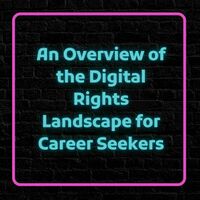An Overview of the Digital Rights Landscape for Career Seekers

- Who: Sandra Ordonez & Danae Tapia
- Date: Tuesday, May 16th
- Time: 9am EDT / 1pm UTC (What time is it in my city?)
- Language: English
- Location: Zoom
RSVP: https://digitalrights.formstack.com/forms/welcometodigitalrights
An Overview of the Digital Rights Landscape for Career Seekers
The digital rights field is an emerging field, which looks at challenges arising at the intersection of social justice, human rights, and technology. While exciting and at the cusp of issues facing societies throughout the world, its expansiveness can also be overwhelming to people trying to break into the field. Join us to gain an overview of the digital rights field, as well as different career paths available to you. You can also ask questions about the future sessions of the Village!
Speakers:
Sandy Ordonez has been working in digital rights for over 12 years, primarily focusing on growing the field and elevating the leadership of underrepresented communities. Currently, the head of TCU, Sandra is one of the first Latinas to occupy leadership positions in the open source community, notably having served as the first Director of Comms for the Wikimedia Foundation.
Danae Tapia is a feminist writer, multimedia artist and technologist born in the Chilean working class. Danae is the founder of The Digital Witchcraft Institute, her fellowship with the Mozilla Foundation and an arts organization where she leads projects that fall at the intersection of posthuman technology, deep migrations and climate justice. She is also a lecturer of Hacking and Autonomous Practices at the Willem de Kooning Academy in Rotterdam, Netherlands.
Notes & Resources
Recording & Presentation
We will post resources soon :)
Q&A Section
Interested in how police forces are addressed in this space. IMO closer to the left side of the previous map
It depends on the context: diversity, ideology, sector, location...
Participant adds: And often times police force is represented by poor and working class people. The role of police to bettering society should be questioned.
I would be curious to hear about how these roles fit into the current landscape where AI is on the rise and mis-/disinformation is quicker and more widespread than ever
Big data and other phenomenos came strong and then dissapeared, it may happen the same with the AI. We focus on people, for example. We have to be flexible and see how these techs adapt to the talent of people
I would also like to hear how NGO's in the Tech space have a different culture (or not) regarding inclusion of marginalized groups (i.e. class, gender, migratory status, knowledge background, etc.). This is the first time I see a Latina in a panel like this (swooning*)
The human rights space has money and privileges and it's not an easy field, as the tech spaces comes with a lot of equity, diversity and inclusion problems. It's a constant struggle and that's one of the reasons this project was born. There is a lot of inspiration coming from the community. We see that they are able to change things, in a quickly way. It's becoming stronger thanks to the collective work in a real international community. One example is the Code of Conduct.
I have a legal training, currently finishing a Phd, I am currently wondering whether I can make more impact by working in an NGO or government, what would your insights be?
It depends on the country and context. Many times, govs and NGOs go hand with hand. NGOs aren't neutral, they are founded by government and have an agenda. You have to evaluate your context.
I have a law degree (plus course on data privacy), currently employed, I would like to cooperate with an NGO concerning policy, compliance and advocacy. I have cooperated with OONI in the past and with an anti-violence center dealing with domestic abuse.
This is how to get opportunities in the community, creating relationships through volunteering and proving trust, a key thing in our community.
How can we support each other as a community? Especially those from smaller or less resourced, have you thought of collective resources for admin, legal, technical, healthcare support.
We try to push big orgs to take care of that. It requires coming together and collective efforts
I'm based in Nigeria, and a lot of jobs in the digital rights field seem to be focused in the global north. Please, what advice would you give for persons in the global south who wish to venture into the Digital Rights Landscape?
Money is in the global north and we can see that in these cases. Slowly, we are moving but you have to choose how you want to enter the space and follow the big logic or an independent path.
What would you recommend to independent researchers to find support and guidance for research ideas? How to make it visible (what outlets or events?) Where to publish (that is not academic) How to find a home for it?
It's really cool to not depend on big corporations and agendas but the challenge is very big, for example, how to reach everyone. So there is no a magic answer.
My interest is people with disabilities, how can you help include them in the digital space? I feel they are Marginalized mostly, especially where information is concerned. I work mostly with people with disabilities.
Karen Reilly helped us back in the day to be more accesible and she wrote about how the Digital Rights community needs to improve in to include folks with disabilities and create spaces and tools for everyone. https://www.digitalrights.community/blog/accessibility-digital-rights-2